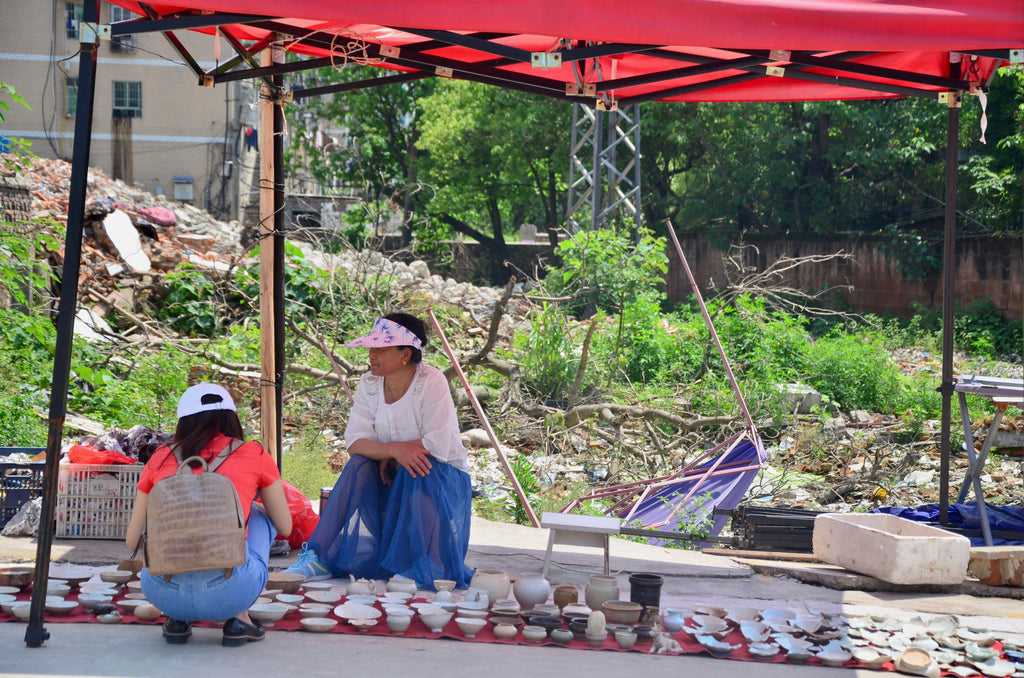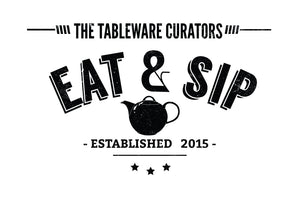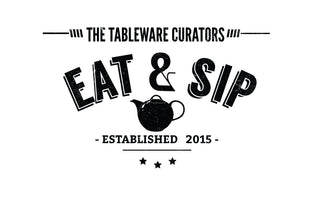
We’ve been asked so many times on Jingdezhen that we’ve decided to write about our last trip there (or at least as much as what we can remember).
 Yangtse River with the eastern part of Jingdezhen in the background. While Ly was taking this...
Yangtse River with the eastern part of Jingdezhen in the background. While Ly was taking this...
 ...I took this
...I took this
When we first arrived in Jingdezhen, it was pretty obvious why Jingdezhen is called the ‘Porcelain Capital’ of the world! The moment we stepped out of the bus station, we were greeted by rows of porcelain shops.
In the shops, smaller blue and white vases lined the display shelves while the bigger ones were simply placed on the pavement outside the shop. There were even random porcelain pieces spotted around the city - on the streets, walls and lamp posts!
 There was porcelain everywhere!
There was porcelain everywhere!
Renowned for its porcelain, Jingdezhen’s artisans have been producing pottery for almost two millenia (~1700 years). Plenty of large homeware companies worldwide head to this city to purchase pottery from the factories here or to get slip-casting moulds for their own production.
Churning out ceramic artists
The Jingdezhen Ceramic Institute attracts students from all over China. In fact, potters from around the world flock there to take up residency in either the Pottery Workshop or Sanbao Ceramic Art Institute.

Ever wondered how big vases are transported? Voila!
Sadly, we didn't have as much time as we'd wanted to explore the ceramic institutes or even the city as we were mainly on a sourcing/learning journey! During our short free time, we did have a very interesting encounter with a local villager (that deserves a whole article on its own).
Now, to the pottery part - there were plenty of pottery markets everywhere but here are the ones we went to!
Pottery Workshop Creative Market (Saturday Creative Market)
Happens: Every Saturday
Location: Courtyard of the Sculpture Factory.
 We came really early to this market, it did get quite crowded later on.
We came really early to this market, it did get quite crowded later on. Can you spot Shan Shan's work?
This market is where you can find works of emerging artists and college students. The vendors for the market were specially curated by famed ceramicist Caroline Cheng. Prior to getting a spot in the market, budding artists have to submit pictures of their prototypes, work processes and actual work!
We later found out that this was mainly because China (especially Jingdezhen, since there are so many makers there) has very weak copyright laws, and makers and factories are known to replicate designs that have become popular.
 Lines of pottery studio and workshops
Lines of pottery studio and workshops
Take time to wander through the alleys and small streets within The Sculpture Factory as they have plenty of workspaces, studios and shops of artists and designers. You can find plenty of work-in-progress ceramic pieces along these small streets too!
 Greenware waiting to dry
Greenware waiting to dry
 Stacks of unglazed WIP pieces of a workshop
Stacks of unglazed WIP pieces of a workshop
We managed to have short yet meaningful conversations with some of the makers there and learnt a lot! A lot of companies (both foreign and local ones) come to The Sculpture Factory to commission craftsman to mass-produce their own designs. Some companies or even tourists would also work with them to make moulds in order for them to slip-cast on their own, back home! Later on, we also found out that the factory craftsmen in Jingdezhen are usually specialised in specifically one skill - mould-making, throwing, painting, glazing or other aspects.
Location: Same area, near the entrance of the Sculpture Factory

 An example of the narrow walkaways - it gets worse as the crowds come in
An example of the narrow walkaways - it gets worse as the crowds come in
And (lucky us!) we even managed to witness a very loud argument between two artists with one accusing the other of copying his work. There were lots of erm, unsavoury words being used and it almost broke out in a fist fight right before the police arrived! Apparently, these squabbles are a common occurrence in the market!
Also, as this market is not curated, you can find a larger variety of work that would appeal to almost every taste.
 A little pond in the middle of the market- we snapped this when some of the shops were already closed or closing
A little pond in the middle of the market- we snapped this when some of the shops were already closed or closing
 Pottery/ handmade lovers will definitely geek out here!
Pottery/ handmade lovers will definitely geek out here!
Random finds along the way
Jingdezhen has plenty of porcelain shops and markets everywhere and we have this habit of sidetracking and venturing into any small streets whenever something catches our eye (we spent way too much time in the ceramic shops).
 A random ceramic shop by the road
A random ceramic shop by the road
On the way back from Ming Qing Yuan, we passed by this ‘carpark space’ across the road from The Sculpture Factory. Hawkers were selling their goods, ranging from broken antique shards to teapots, on a mat placed on the floor. We were quite amazed by some of the products being sold here such as the saggers (see image below).
In the past where the traditional (coal) kiln was used, ceramic artworks were placed in saggers to protect the piece from the debris flying around the firing chamber such as dust and soot.

It was so hot everyone was seeking refuge under the shade!
 The saggers on sale!
The saggers on sale!
Other ceramic markets and shops
True to its label, ceramic markets were popping up here and there every day and night and we loved strolling around looking at the wares being sold!

Each table had to have its own bright and glaring table lamp because the alley was too poorly lit.
We found this makeshift night market in a residential area when we were wandering around one night! Hawkers here sell mostly handmade ceramic wares from the factories. A tiny bud vase costs as little as $1 and an exquisite looking tea pot with intricate drawings that caught our eye costs only about $20!

 The same alley looking so different in the day and at night. Pardon the blurrish night photo!
The same alley looking so different in the day and at night. Pardon the blurrish night photo!
If you are looking for ‘proper’ pottery shops, there is a pottery street with a line of such ceramic shops that are worth the exploration. Most of them open only in the evening onwards, so don't be like us and head there too early! Some of these shops were set up by individual artists themselves while others are owned by the larger pottery companies.

 陶艺街 - which literally means 'Pottery Street'
陶艺街 - which literally means 'Pottery Street'
Went back again at night and all the owners were friendly and were always up for a good conversation. We even managed to get to drink tea with some of the shop owners! Do expect the prices on this street to be slightly more expensive, ranging from $15 (a set of ceramic coasters) to as much as $1000 (an elaborately painted vase).

Also attempted a visit to the Hutian Ancient Kiln, which unfortunately was under going some renovation at that time.
--
Of course, there were so many more markets and shops that we did not manage to put into this article. But if you are a pottery lover, this city is a must-go and here are more photos to tempt you to make a trip there -






---
Click here to browse all our products by Chinese makers!


Comments
Steve:
Thanks for the post. Brings back memories for me from my 2016 trip there. I met a young lady as I arrived on the train and she and her friends gave me an amazing 3 day personal tour of the city. Everything from the porcelain museum to the street vendors to bamboo forests nearby.
You’ve got some great photos that capture the real Jingdezhen!
Jul 01, 2024
Leave a comment